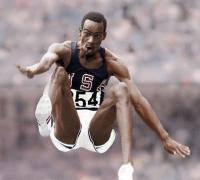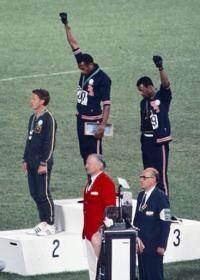“The Sportsworld is a toy department of human life.” – Howard Cossell
By October of 1968, the human race was certainly in need of the diversion and amusement that the XIX Olympiad in Mexico City, Mexico, promised.
1968 was a highly politicized year. China was in the throes of the Cultural Revolution, Czechoslovakia’s burst of freedom was crushed by Soviet troops, and the French government was nearly overthrown by student-led demonstrations. Here in the United States, civil rights leader Reverend Martin Luther King, Jr. was assassinated outside his hotel room in Memphis on April 4th. Devastating riots shook our country in the aftermath. Just as we had caught our collective breath from that blow, another sent us reeling. On June 6th, Senator Robert Kennedy, fresh from a resounding victory in the California Democratic Primary, was killed as he left a hotel in Los Angeles. Demonstrations against our nation’s involvement in the war in Vietnam had become a regular feature on the nightly news and threatened to close down many college campuses. Our country seemed to be coming apart at the seams.
The show in Mexico City offered the perfect escape from the problems of the world. Yet, as the games approached, 300,000 Mexican students and teachers were on a country-wide strike. Ten days before the Olympics were scheduled to open, the government troops opened fire on several thousand unarmed students holding a rally in the Plaza de las Culturas in Mexico City. Hundreds of young people were killed.
Meanwhile, 40 nations threatened to boycott the Games if segregated South Africa was permitted to field a team. The South Africans were barred from competing, and on October 12th, the torch was lit and the Olympics began on schedule.
The XIX Olympiad is best remembered here in the United States for two events: Bob Beamon’s world-record smashing long jump and the victory stand demonstration by sprinters Tommie Smith and John Carlos.
First, Beamon’s amazing accomplishment. The world’s record for the long jump was 27 feet, 4.75 inches when these Olympic Games began. Beamon felt extremely confident that day, and when he landed from his first jump in competition, he knew he had jumped very well. “Maybe even 27 feet, 6 inches,” he figured. Beamon then had to wait much longer than normal for an official measurement. The marshalls quickly discovered that his jump was so long that their optical equipment was not designed to measure that great a distance. After getting a new tape, the officials measured 8.9 meters, or 29 feet and 2.5 inches.
But no, that was humanly impossible! A different set of officials were called in. The result was the same. Twenty-nine feet, two and one-half inches. Beamon’s record has stood for more than 23 years and is still regarded as the most remarkable individual performance in Olympic history.
Bob Beamon’s record-shattering leap was, however, in some ways overshadowed by an incident which occurred during the medal ceremony for the 200-meter dash. America’s Tommie Smith had won the Gold medal in the event in a world record 19.8 seconds. Smith’s San Jose State College teammate, John Carlos, was the Silver medalist in the event. While waiting under the stands for the ceremony to begin, Smith pulled two black gloves from his bag and gave the left glove to Carlos. On the spur of the moment, they agreed on their gesture. On the victory stand during America’s National Anthem, Smith raised his black-gloved right fist high and straight above his head, and Carlos raised his black-gloved left fist as well. Smith wore a knotted black scarf around his neck and both wore long black socks and no shoes. Both stood with heads bowed, eyes closed, not saying a word. They later explained that their clenched fists symbolized Black Power and unity, while their stocking feet were a reminder of black poverty in America. John Carlos told reporters, “White America will only give us credit for an Olympic victory. They’ll say I am an American, but if I did something bad, they’d say I was a Negro.”
Olympic officials, who had ignored the Mexican slaughter of student demonstrators, were outraged. The two were suspended by the International Olympic Committee, and the U.S. Olympic Committee ordered the two to leave Mexico within 48 hours.
The international response to the demonstration was generally sympathetic. Back in the USA, however, they were not so well received. Chicago sports columnist Brent Musberger spoke for the “Establishment” when he called the two sprinters “black-skinned storm-troopers.” America was not happy to have their escape from world dissension interrupted in such a bold manner.
These were not the only stories in Mexico City. The American team performed brilliantly in a variety of events, winning a total of 107 Gold, Silver and Bronze medals. The U.S. swim team, the major contributors to that total, won 58 medals, including 23 Gold.
The U.S. basketball team, despite the absence of college superstars Lew Alcindor (Kareem Abdul Jabbar) and Elvin Hayes, continued their dominance of the sport by winning nine straight games en route to the Gold medal. Spencer Haywood and JoJo White helped the Americans run their record to 55-0 in Olympic competition.
Other U.S. highlights included George Foreman’s Gold medal in heavy-weight boxing, sprinter Wyomia Tyus capturing two Gold medals (100 meters and anchor of the women’s 4x100 relay), high jumper Dick Fosburg’s world record 7 feet, 4.25 inches “flop,” Al Oerter’s fourth straight discus Gold, and Bill Toomey’s victory in the decathlon.
Our American athletes put on a remarkable display of athletic prowess at Mexico City in 1968 - they made us proud to be Americans. Yet, the impromptu actions of John Carlos and Tommie Smith disturbed many. They felt that the Olympics was no place for any political statements.

